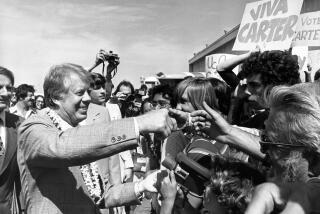Denison Kitchel, 94; Ran Goldwater’s Presidential Bid
- Share via
Denison Kitchel, Barry Goldwater’s influential 1964 presidential campaign manager and longtime friend and advisor, has died. He was 94.
Kitchel died Oct. 10 at his home in Scottsdale, Ariz. No cause of death was given.
Appointed as Goldwater’s campaign manager in January 1964, Kitchel was a virtual unknown in national politics.
But he had known the Arizona senator since Goldwater’s days running the family’s Phoenix department store in 1935. He ran Goldwater’s successful 1952 Senate campaign and continued to be the blunt-spoken, conservative Republican’s most influential advisor.
During the 1964 presidential campaign, Kitchel fostered Goldwater’s support for the North Atlantic Treaty Organization, and he persuaded Goldwater to concede he was wrong in originally opposing the Supreme Court school integration decision and the use of federal troops to enforce that decision in the South.
Kitchel relished strategizing, dealing with issues and drafting policies, such as Goldwater’s Senate speech in which he explained his vote against the civil rights bill.
Politics, he could do without.
When a mother placed her baby in Goldwater’s arms during the New Hampshire primary, Kitchel muttered from the sidelines, “If he kisses that baby, I resign.”
Kitchel was born in Bronxville, N.Y. He graduated from Yale University in 1930 and, after graduating from Harvard Law School in 1933, he joined the Phoenix law firm of Ellinwood & Ross, which became Evans, Kitchel & Jenckes.
The firm, which closed its doors in 1990 after 79 years, was one of Arizona’s most influential. Chief among the prominent lawyers and judges Evans, Kitchel & Jenckes produced was Chief Justice William Rehnquist, who began working at the firm in 1953 after graduating at the top of his law school class at Stanford and clerking for Supreme Court Justice Robert Jackson.
Kitchel, who served in the Army Air Corps in England during World War II and was discharged as a lieutenant colonel, was considered an authority on constitutional, labor and international law.
He wrote two books: “Too Grave a Risk” (1963), in which he argued it would be dangerous to yield U.S. sovereignty to a world court dominated by nations with legal systems different from ours; and “The Truth About Panama” (1978), which dealt with the consequences of agreements between the United States and Panama.
He also served as general counsel for the Arizona State Republican Committee (1957-63). In 1958, he wrote the platform of the Arizona Republican Party, in which he summarized his conservative philosophy in eight brief paragraphs. A sample excerpt:
“The preservation of freedom demands that governmental restraints be kept at a minimum and that both freedom of association and the right to work is protected.”
Kitchel is survived by his wife, Naomi; two sons, James of Scottsdale and Harvey of San Diego; and four grandchildren.
More to Read
Get the L.A. Times Politics newsletter
Deeply reported insights into legislation, politics and policy from Sacramento, Washington and beyond. In your inbox twice per week.
You may occasionally receive promotional content from the Los Angeles Times.










